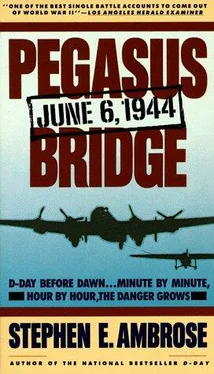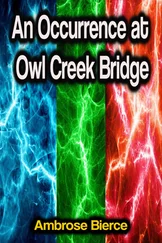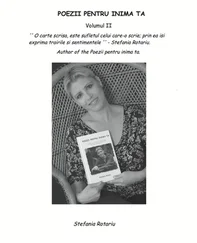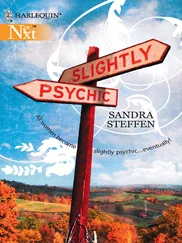Stephen Ambrose - Pegasus Bridge
Здесь есть возможность читать онлайн «Stephen Ambrose - Pegasus Bridge» весь текст электронной книги совершенно бесплатно (целиком полную версию без сокращений). В некоторых случаях можно слушать аудио, скачать через торрент в формате fb2 и присутствует краткое содержание. Жанр: История, на английском языке. Описание произведения, (предисловие) а так же отзывы посетителей доступны на портале библиотеки ЛибКат.
- Название:Pegasus Bridge
- Автор:
- Жанр:
- Год:неизвестен
- ISBN:нет данных
- Рейтинг книги:5 / 5. Голосов: 1
-
Избранное:Добавить в избранное
- Отзывы:
-
Ваша оценка:
- 100
- 1
- 2
- 3
- 4
- 5
Pegasus Bridge: краткое содержание, описание и аннотация
Предлагаем к чтению аннотацию, описание, краткое содержание или предисловие (зависит от того, что написал сам автор книги «Pegasus Bridge»). Если вы не нашли необходимую информацию о книге — напишите в комментариях, мы постараемся отыскать её.
Pegasus Bridge — читать онлайн бесплатно полную книгу (весь текст) целиком
Ниже представлен текст книги, разбитый по страницам. Система сохранения места последней прочитанной страницы, позволяет с удобством читать онлайн бесплатно книгу «Pegasus Bridge», без необходимости каждый раз заново искать на чём Вы остановились. Поставьте закладку, и сможете в любой момент перейти на страницу, на которой закончили чтение.
Интервал:
Закладка:
Browning had already become a legendary figure in the army. Noted especially for his tough discipline, he looked like a movie star, dressed with flair, and was married to the novelist Daphne du Maurier. It was she who in 1942 suggested a red beret for airborne troops, with Bellerophon astride winged Pegasus as the airborne shoulder patch and symbol, pale blue on a maroon background.
Wally Parr was one of the thousands who responded to the call to wear the red beret. He had joined the army in February, 1939, at the age of 16 (he was one of more than a dozen in D Company, Ox and Bucks, who lied about their age to enlist). Posted to an infantry regiment, he had spent three years 'never doing a damn thing that really mattered. Putting up barbed wire, taking it down the next day, moving it... .Never fired a rifle, never did a thing'. So he volunteered for airborne, passed the physical, and was accepted into the Ox and Bucks, just then forming up as an air landing unit, and assigned to D Company. After three days in his new outfit, he asked for an interview with the commander, Major John Howard.
'Ah, yes, Parr', Howard said as Parr was marched into his office. 'What can I do for you?'
'I want to get out'. Parr stated. Howard stared at him. 'But you just got in.' 'Yes, sir', Parr responded, 'and I spent the lasty three days weeding around the barracks block. That's not what I came for. I want to transfer from here to the paras. I want the real thing, what I volunteered for, not these stupid gliders, of which we don't have any anyway.'
'Now you take it easy', Howard replied. 'Just wait.' And he dismissed Parr without another word. Leaving the office, Parr thought to himself, 'I'd better be careful with this fellow'.
In truth, Parr as yet had no idea just how tough his new company commander was. Howard was born December 8, 1912, eldest of nine children in a working-class London family. From the time John was two years old until he was six, his father. Jack Howard, was off in France, fighting the Great War. When Jack returned he got a job with Courage brewery, making barrels. John's mother, Ethel, a dynamic woman, managed to keep them in clean clothes and adequately fed. John recalls, 'I spent the best part of my childhood, up to the age of thirteen or fourteen, pushing prams, helping out with the shopping, and doing all that sort of thing'.
John's one great pleasure in life was the Boy Scouts. The Scouts got him out of London for weekend camps, and in the summer he would get a fortnight's camp somewhere in the country. His chums in Camden Town did not approve: they made fun of his short pants 'and generally made my life Hell'. Not even his younger brothers would stick with the Scouts. But John did. He loved the out-door life, the sports and the competition.
John's other great passion was school. He was good at his studies, especially maths, and won a scholarship to secondary school. But the financial situation at home was such that he had to go to work, so he passed up the scholarship and instead, at age fourteen, took a full-time job as a clerk with a firm of stockbrokers. He also took evening classes five nights a week in English, maths, accounting, economics, typing, shorthand, anything that he thought would be useful in his work. But in the summer of 1931, when he returned to London from Scout camp, he discovered that his firm had been hammered on the stock exchange and he was out of a job.
By this time the younger Howard children were growing, taking up more space, and the house was bursting. John offered to move out, to find a flat and a job of his own. His mother would not hear of his breaking up the family, however, so he decided to run off and enlist in the army.
He went into the King's Shropshire Light Infantry. The older soldiers, Howard found, were 'very rough and tough. ... I freely admit I cried my eyes out for the first couple of nights when I was in the barracks room with these toughs and wondered if I'd survive.'
In fact, he began to stand out. In recruit training, at Shrewsbury, he excelled in sports - cross-country running, swimming, boxing, all things he had done in the Scouts. To his great benefit the British army of 1932, like most peacetime regular armies everywhere, was fanatical about sports competition between platoons, companies, battalions. When John joined his battalion, at Colchester, the company commander immediately made him the company clerk, a cushy job that left him with plenty of free time for sports. Then he was sent on an education course, to learn to teach, and when he returned he was put to teaching physical education and school subjects to recruits, and to competing both for his company and battalion in various events.
That was all right, but John's ambitions reached higher. He decided to try for a commission, based on his sports record, his educational qualifications - all those night courses - and his high scores on army exams. But getting a commission from the ranks in the peacetime army was almost impossible, and he was turned down. He did get a promotion to corporal, and transferred to teach in the school at the Regimental Depot at Shrewsbury.
And he met Joy Bromley. It was a blind date, John being dragged along simply because his buddy had two girls to look after. Joy was supposed to be his buddy's date, but John took one look at her and lost his heart forever. Joy was only sixteen (she lied and told John she was seventeen), slim but with a handsome figure, pert in her face, lively in her carriage, quick to laugh, full of conversation. She had come on the date reluctantly - her people were in the retail trade in Church Stretton near Shrewsbury, she had already been dating a boy from Cambridge, and, as she told her friend, 'I'm not allowed to go out with soldiers'. 'Well, it's only for coffee', her friend persisted, 'and I've made a promise'. So Joy went, and over the coffee she and John talked, the words, the laughs, the stories bubbling out. At the train station, John kissed her good -night.
That was in 1936, and a courtship ensued. At first it was secretive, Joy fearing her mother's disapproval. They met under a large copper beech tree at the foot of the garden at Joy's house. John did not much care for this sneaking around, however, and he decided to proceed on a direct line. He announced to Joy that he was going to see her mother. 'Well, I nearly died', Joy recalled. 'I thought mother wouldn't see him', and if she did, then 'she would flail me for making such an acquaintance'. But Mrs Bromley and John got along splendidly; she told Joy, 'You've got a real man there'. In April, 1937, they were engaged, promising Joy's mother they would wait until Joy was older before marrying.
In 1938, John's enlistment came to an end. In June, he joined the Oxford City Police force. After a tough, extended training course at the Police College in Birmingham, in which he came in second of 200, he began walking the streets of Oxford at night. He found it 'quite an experience. You are on your own, you know, anything can happen.'
It was here, on the streets of Oxford at midnight, with the young undergraduates staggering their way home, the occasional thief, the odd robbery, the accidents, the pub staying open after closing hour, that John Howard first came into his own. He had already demonstrated that he was reliable, exceedingly fit, a natural leader in games, a marvellous athlete himself, in short one of those you would look to for command of an infantry platoon, perhaps even a company, in time of war. But these qualities he shared with thousands of other young men. However admirable, they were hardly unique. What was unique was Howard's love of night. Not because it gave him an opportunity to indulge in some petty graft, or bash in a few heads - far from it. He loved the night because while walking his beat he had to be constantly alert.
Читать дальшеИнтервал:
Закладка:
Похожие книги на «Pegasus Bridge»
Представляем Вашему вниманию похожие книги на «Pegasus Bridge» списком для выбора. Мы отобрали схожую по названию и смыслу литературу в надежде предоставить читателям больше вариантов отыскать новые, интересные, ещё непрочитанные произведения.
Обсуждение, отзывы о книге «Pegasus Bridge» и просто собственные мнения читателей. Оставьте ваши комментарии, напишите, что Вы думаете о произведении, его смысле или главных героях. Укажите что конкретно понравилось, а что нет, и почему Вы так считаете.




![Stephen Ambrose - Citizen Soldiers [Condensed]](/books/346737/stephen-ambrose-citizen-soldiers-condensed-thumb.webp)




